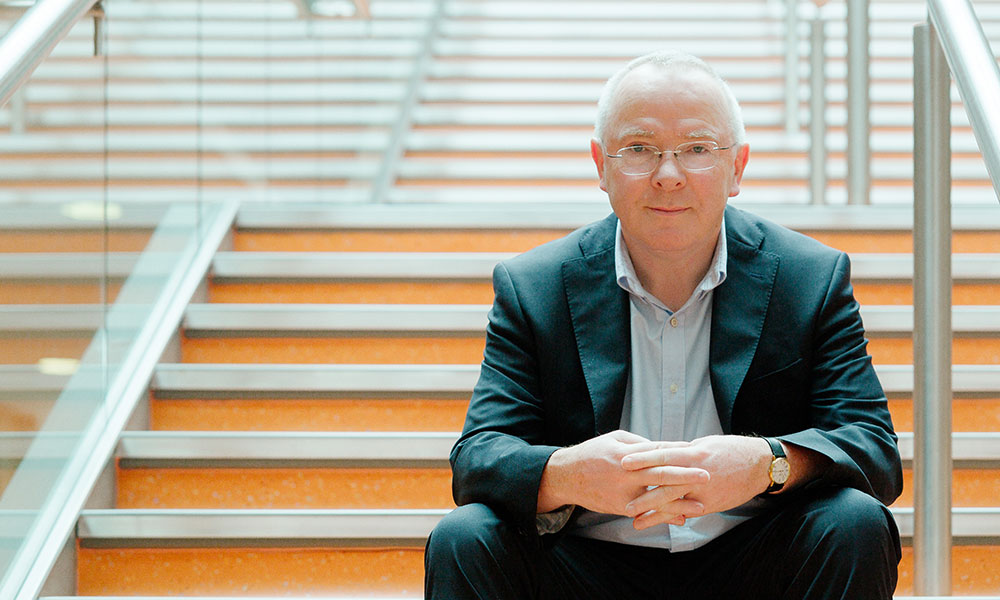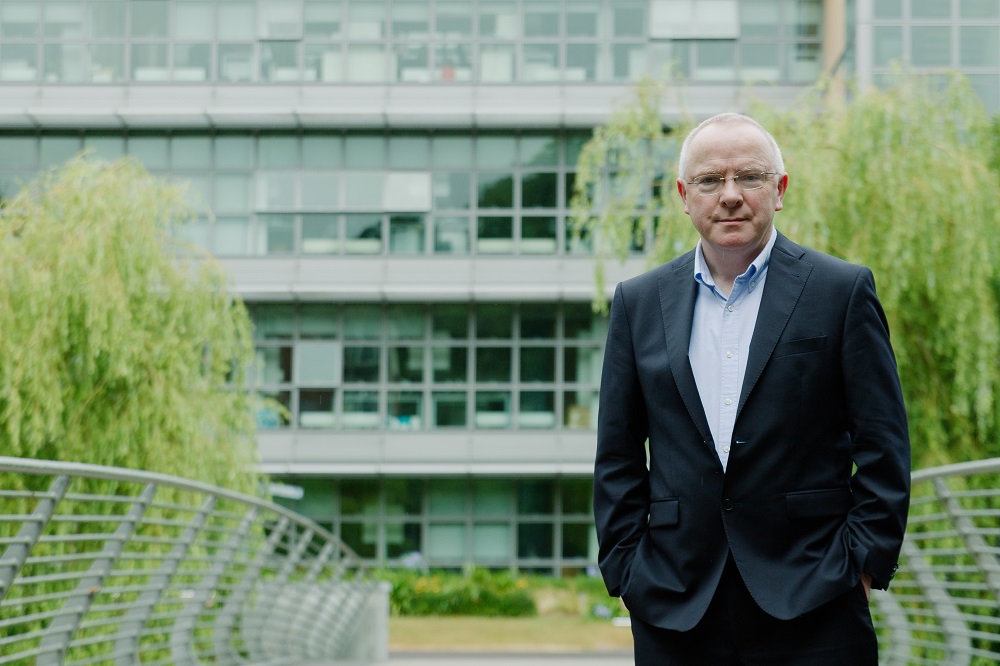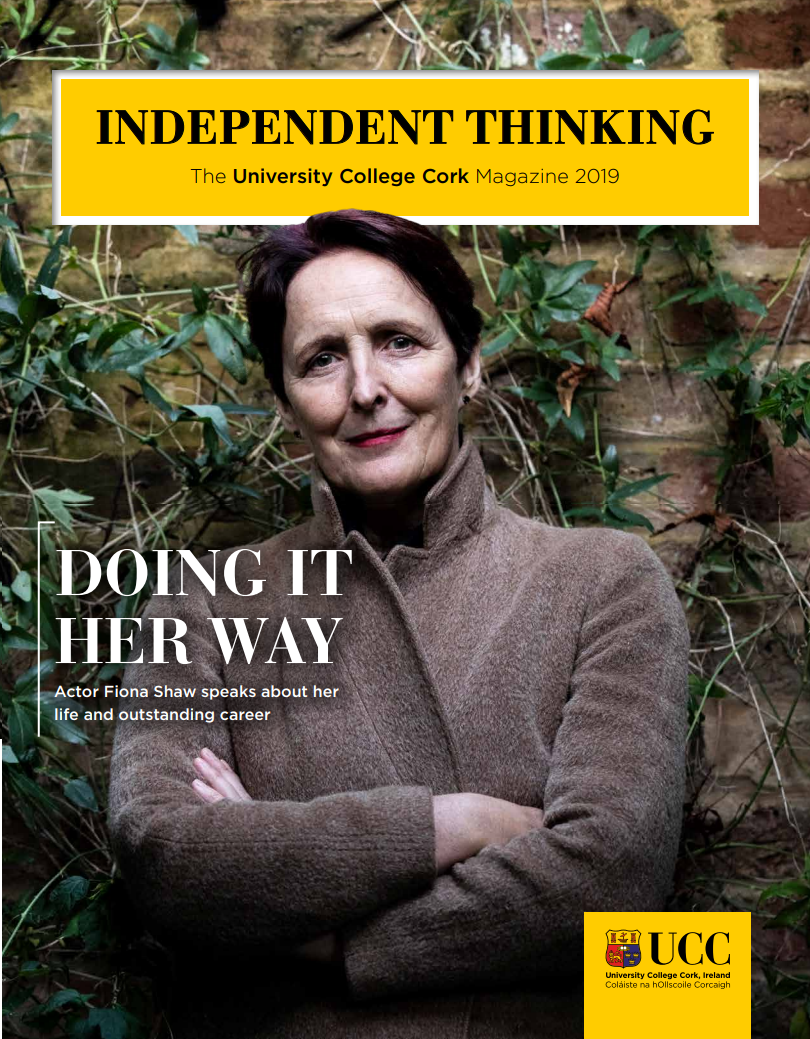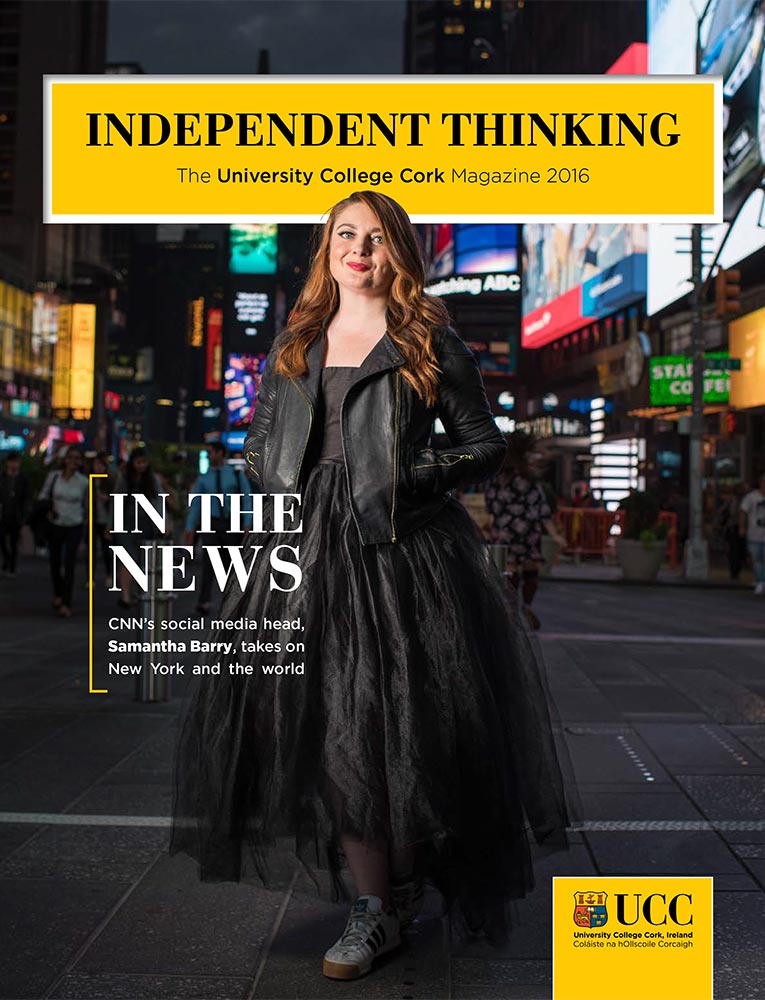Features
- Can Do, Will Do
Stefanie Preissner
- It’s not just a gut feeling
John Cryan & Ted Dinan
- Active citizen
Emily Duffy
- Leading the charge
Alan Hayes
- Gaeltacht adventures
Bliain Na Gaeilge
- Eachtraí sa Ghaeltacht
Bliain Na Gaeilge
- Don’t worry, bees happy
Fiona Edwards Murphy
- The times they are a-changin’
LGBT Staff Network
- Back to her roots
Maria Kirrane
- Shining a light
Mental Health in the Community
- Patrick’s call to nursing was no accident
Patrick Cotter
- A healthy separation, long overdue
Ivan Perry
- Woman of Steele
Susan Steele
A healthy separation, long overdue
Vaccinations and screening programmes that keep us safe and well originate in public health research, but as the Dean of the new school of that discipline at UCC, Professor Ivan Perry, tells Margaret Jennings, the credit for such work often goes elsewhere.

If we were to personify the School of Public Health, newly opened at the university last November, it would be fair to say that it has stepped out proudly from the shadow of the “parent” School of Medicine; that its day has come to shine.
Prior to that, as the Department of Epidemiology and Public Health, it had grown so considerably, that it was effectively in all but name a school – with internationally competitive research outputs; a well-established educational programme with undergraduates, masters and PhD students; and a public health outreach and advocacy agenda, working with government and other policy makers.
“We were beginning to function like a school, and we were keen to have a level of independence and autonomy that you wouldn’t have as a department within the med school,” says its Dean, Ivan Perry.
“For example, we were one of the first departments in Europe to have public health as an undergraduate science degree (the BSc Public Health Sciences) which we introduced in 2004, and we now have almost 300 graduates from the programme working in a wide range of areas in the Irish private and public sector and in academia,” he adds proudly.
The focus of epidemiology - which is one of the core public health sciences – is on understanding the fundamental causes of disease; whereas, for public health, the parent discipline, the focus is on prevention. And while public health is complementary and works well with medicine, it is not a medical sub-speciality; it is a parallel discipline.
A more recent example of the school playing a leading role in changing health policy and practice in Ireland, is the impact its research had in influencing the decision by the Minister for Finance to introduce a tax on sugar-sweetened drinks, which came into force in April of this year.
“Once your focus is on trying to understand the causes and prevention of disease, that moves you away from a biological, as it were - a biomedical somewhat reductionist view of health and disease - to the full range of causes,” says Ivan.
Public health goes deeper, into exploring societal determinants of health and wellbeing, including but not confined to lifestyle issues such as smoking, exercise and diet. Take obesity, for example, which is one of the research themes of the school. In 1990, the year that Ivan says his daughter was born, there were relatively low rates of obesity in children and adults.
“Then, when you move forward to 2018, we are in a situation where 60% of adults are either overweight or obese and 25% of children. Within the 60% of adults who are overweight, roughly 25% are actually obese, and if you go back to 1990 that figure was 10%,” he says.
This cannot be explained at the level of individual behaviour or in simple psychological terms - “there has not, for instance, been a mass collapse of willpower in relation to diet since 1990”, he points out. It’s that our environment has changed: “We have created what we call an obesogenic environment, where you have food which is high in fat, sugar and salt, (FSS) available in greater quantities and in far more settings than before.”
Add to that, the fact that as a society our opportunities for physical activity are very much reduced and that the FSS food – which is saturated in calories - is so cheap, and you get a clearer picture of the fundamental societal drivers of the current epidemic of obesity in children and adults. Public health, in its essence, is concerned with understanding and influencing these societal level drivers of health and wellbeing. It is important, Ivan adds, not to over emphasise “personal agency” – the notion that we are in control of our health-related behaviours. While clearly we have some control over the choices we make in relation to diet, exercise and similar behaviours, we tend to underestimate the effects of the wider social and economic environment, including income and social status on our behaviour.

An important part of the process is working with policymakers to translate public health research into practice. “We currently have a national obesity policy for Ireland 2016-2025, and I sat on the committee with others who drafted the policy and was involved in setting the targets. We are now working with the Department of Health and other stakeholders at implementing that policy,” Ivan says.
Another more recent example of the school playing a leading role in changing health policy and practice in Ireland in relation to obesity, is the impact its research had in influencing the decision by the Minister for Finance to introduce a tax on sugar-sweetened drinks, which came into force in April.
The school draws on people from a wide range of disciplines including those with skills in epidemiology, statistics, disease surveillance, nutrition, psychology and qualitative research. All of these disciplines contribute to a functioning public health system in the country, which unfortunately tends to be taken for granted when it is working well.
“When you look at the health sector, it’s obvious to everybody that we need doctors and nurses because what they do is very clear – it’s tangible and concrete,” says Ivan. “Public health work is subtler, involving staff with skills to identify public health issues; to collect, analyse and interpret data, and to translate research into practice.
We have a number of excellent senior colleagues and staff who will bring the School to the next level, and I feel very fortunate to have reached this point.
“The other fundamental thing about public health is that it is often most effective when we are working in the background and allowing other people take the credit and the limelight,” he says. “That’s one of the paradoxes of public health, because you can only get stuff done if you bring other people onside. And nine times out of ten, the best way to get people onside is to give them ownership of an issue.”
The school is in a fine position to do this with a solid core of six professors, and over 70 staff in total including academic, administrative and research staff and 300 students - more than half of whom are postgrads.
It’s a far cry from when Ivan started in UCC in 1997 as a one-man department, with an admin assistant, in the Distillery House in the North Mall. “A month later, the university funded a lecturer. From the med school’s point of view, I was a persistent thorn in their side, because obviously you just have to keep pushing for resources and we gradually built up a team, initially through part time and honorary appointments.”
Due to retire in five years, Ivan is happy that he is now leaving what he calls a tangible legacy: “We have a number of excellent senior colleagues and staff who will bring the School to the next level, and I feel very fortunate to have reached this point. I could retire in the morning without any concerns for the future of academic public health in UCC.”
For more information on Public Health at UCC, visit www.ucc.ie/en/publichealth.



